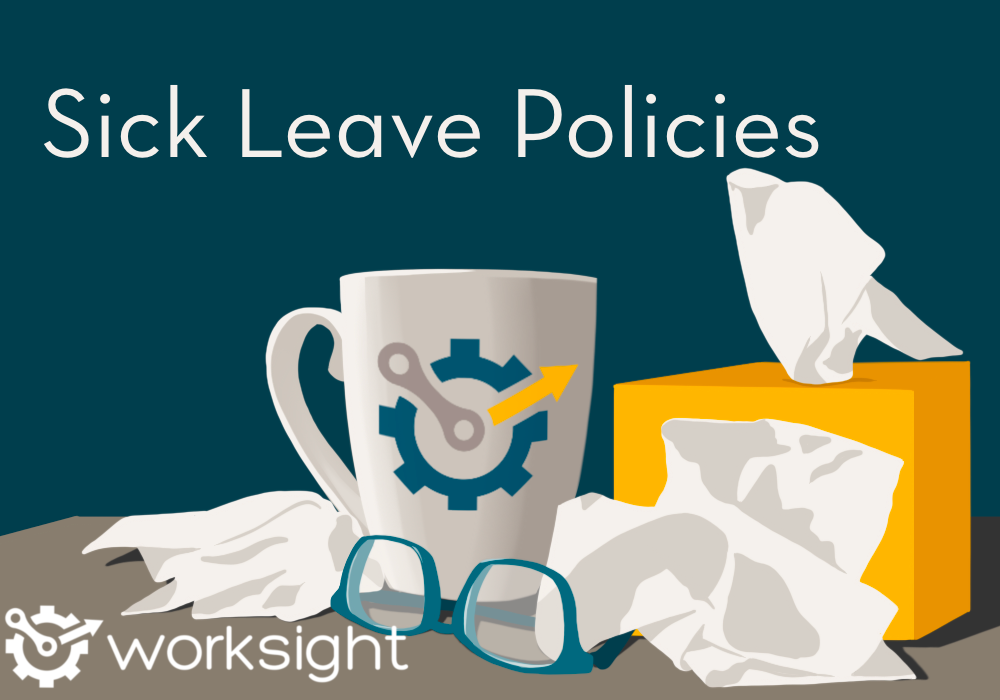Sick Leave Policies
Typically, employers choose to offer several types of paid time off, like sick leave. But depending on the business location, employers may no longer have a choice. Little by little, paid sick leave laws are on the rise.

Sick Leave Policies
Typically, employers choose to offer employees several types of paid time off, like sick leave. But depending on the business location, employers may no longer have a choice. Little by little, paid sick leave laws are on the rise.
If your employees work in a jurisdiction with mandatory paid sick leave, you must comply. But to remain compliant, you need know about the law in the first place.
What do paid sick leave laws entail?

When your employees are sick, the last thing they want to do is get out of bed and work, and as an employer, you do not want them exposing everyone at your business to infection.
Sick leave is time off an employee can take if they or a family member are sick. With paid sick leave, the employee receives the same wages as if they worked.
Generally, paid sick leave laws specify information like accrued time off rates, maximum accrual limits, and carry forward limits. Employers can still choose to go beyond the legal requirements (e.g., letting employees accrue more time than the accrual limit).
Paid Sick Leave in the United States

Federal Policies
Currently, there is no federal sick leave law. However, sixteen states and Washington D.C. provide state sick pay.
State Policies
As of 2021, sixteen US states (Arizona, California, Colorado, Connecticut, Maine, Maryland, Massachusetts, Michigan, Nevada, New Jersey, New Mexico, New York, Oregon, Rhode Island, Vermont, and Washington); have state sick leave policies. The main difference between state laws is how quickly employees can accrue paid sick leave. However, all states allow employers to "front-load" sick time. Front-loading means that employers give employees their paid sick leave hours in one lump sum at the beginning of the year.
Employers who front-load time off do not need to let employees carry over hours.
| State | Accrual | Cap | Carry Forward |
|---|---|---|---|
| Arizona | 1 hour / 30 worked | 24 hours (employers with fewer than fifteen employees) 40 hours (employers with fifteen or more employees) |
Carry forward up to 24 hrs to the next year. Or pay out unused sick leave. Employers who front-load time off do not need to let employees carry over hours |
| California | 1 hour / 30 worked | 24 hours | Unused carried from year to year. If an employee does carry over time, employers can limit their total accrued paid sick leave to 48 hours. |
| Colorado | 1 hour / 30 worked | 48 hours | carry over up to 48 hours of unused to the next year |
| Connecticut | 1 hour / 40 worked | 40 hours | carry over up to 40 hours of unused to the next year |
| Maine | 1 hour/ 40 worked | 40 hours | carry over up to 40 hours of unused to the next year. The amount of time an employee can accrue in the next year is reduced by the number of hours the employee carries over |
| Maryland | 1 hour / 30 worked | 40 hours | carry over up to 40 hours of unused to the next year total accrued time cannot be more than 64 hours. |
| Massachusetts | 1 hour / 30 worked | 40 hours | carry over up to 40 hours of unused to the next year. Employers who front-load time off do not need to let employees carry over hours. |
| Michigan | 1 hour / 35 worked | 40 hours | carry over up to 40 hours of unused to the next year. Employers who front-load time off do not need to let employees carry over hours. |
| Nevada | 0.01923 hours / 1 hour worked | No stated cap; can cap usage at 40 hours per year | Employees can carry over accrued paid time off. However, employers can limit the carryover amount to 40 hours per benefit year |
| New Mexico (Effective July 1, 2022) | 1 hour / 30 worked | No stated cap; can cap usage at 64 hours per 12-month period. Alternatively, employers frontload the full 64 hours to on Jan. 1 of each year |
Employees can carry over accrued paid time off. |
| New Jersey | 1 hour / 30 worked | 40 hours | carry over up to 40 hours of unused to the next year |
| New York | 1 hour / 30 worked | 40 hours (employers with 5 – 99 employees) 56 hours (employers with one hundred or more employees) |
The state has not yet announced carryover rules. |
| Oregon | 1 hour / 30 worked OR 1 ⅓ hours / 40 worked | 40 hours | carry over up to 40 hours of unused to the next year. Employers can cap an employee's total accrued balance at 80 hours. Employers who front-load do not need to let employees carry over unused hours. |
| Rhode Island | 1 hour / 35 worked | 40 hours | Employers must let employees carry over their unused paid sick leave. Or employers can pay employees for their accrued time. |
| Vermont | 1 hour / 52 worked | 40 hours | Employees who accrue paid sick leave can carry up to 40 hours from one year to the next. Employers who give employees a lump sum of paid sick leave do not need to let employees carry it over |
| Washington | 1 hour / 40 hours worked | Employers cannot set an accrual cap | carry over up to 40 hours of unused to the next year. |
| Washington DC | 1 hour / 87 hours worked employers with fewer than twenty-five employees) 1 hour / 43 hours worked (employers with 25 – 99 employees) 1 hour / 37 hours worked (employers with one hundred or more employees) |
24 hours (employers with less than 25 employees) 40 hours (employers with 25 – 99 employees) 56 hours (employers with one hundred or more employees) |
Employees can carry over their earned but unused paid sick leave from one year to the next. |
Paid Sick Leave in Canada

Federal Policies
Canada now has ten paid sick days per year but only for federally regulated workers.
Under the Canada Labour Code (CLC), the workers in the following sectors, are deemed to be federally regulated employees:
- Banking (eg. CIBC bank)
- Inter-provincial/international transportation (e.g., trucking companies, railways)
- Airports, and Air transportation (e.g., Air Canada)
- Television, Telephone, Radio, and Cable systems (e.g., Rogers/Bell)
- Fisheries
- Grain Elevators
- Uranium Mining and Processing
- First Nation Activities and Crown Corporations
Provincial Policies
As of this writing only three provinces have paid sick leave policies.
| Province | Accrual | Cap | Carry Forward |
|---|---|---|---|
| British Columbia | 5 days after 90 days of employment with their current employer | 5 days | none |
| Prince Edward Island | 1 day after 5 consecutive years of employment with their current employer | 1 day | none |
| Quebec | After 3months of uninterrupted service, an employee mayreceive 2 days of paid absence per year. | 2 days | none |





